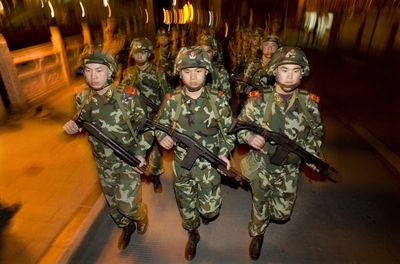China tightens security of Tibet
Dalai Lama denounces ‘brutal crackdown’

KANGDING, China – Authorities in Tibet and restive parts of western China were on heightened alert today for possible unrest on the 50th anniversary of a failed uprising against Chinese rule and the Dalai Lama’s flight from Tibet.
Residents and businesses in the regional capital of Lhasa reported seeing increased patrols of armed police throughout the city.
“There are more paramilitary police in the streets. They’re at bus stations, road intersections, even small alleys,” said a staffer at the West Tour Go tourism agency in the capital, who declined to give his name. Calling it a sensitive time, he said the stepped up security “actually makes me feel safer. The police will get rid of any small riots.”
Photos taken on the eve of the anniversary showed squads of paramilitary police carrying automatic rifles across their chests patrolling the streets around the Jokhang temple, Tibetan Buddhism’s holiest shrine.
Beijing has sought to head off trouble on the anniversary that marks the start of the 1959 abortive Tibetan revolt against Chinese rule. A peaceful commemoration last year by monks in Lhasa, Tibet’s regional capital, erupted into rioting against Chinese rule four days later and spread to surrounding provinces – the most sustained and violent demonstrations by Tibetans in decades.
Today, the Dalai Lama, the Tibetan spiritual leader who is often demonized by Beijing, denounced what he called China’s “brutal crackdown” in Tibet since the protests last year.
“Even today, Tibetans in Tibet live in constant fear and the Chinese authorities remain constantly suspicious of them,” he said, according to advance copies of a speech released by aides from the Indian hill town of Dharmsala.
In neighboring Sichuan’s Ganzi prefecture, where some of the most violent protests occurred last year, rows of riot police and soldiers with machine-guns marched through the middle of Kangding town past the main square.
The night before, local Communist Party official Xiang Luo had exhorted paramilitary troops to be especially vigilant: “You must do this month’s work well. This is crucial.”
Officials there reported receiving an emergency notice Monday from the provincial government, ordering foreigners – including reporters – out of the mixed Chinese-Tibetan town. Kangding, known for its strong sense of Tibetan identity, had been the last corner of Ganzi to remain open.
The security cordon around the entire region has tightened with increased controls at Tibet’s border points and main highways to prevent disruptions by supporters of the Dalai Lama, China’s public security ministry said.
In Tsedang, Tibet’s third-largest town, two hours southeast of Lhasa, a staffer at the Shannan Yulong Holiday Hotel said the heightened security has been in place since last week.
“Police come to check out our registration for people staying in the hotel every day. I’m guessing those who aren’t Lhasa residents will not be able to enter the city now. Even though it seems relatively quiet, we can feel that the security is very tight now,” said the staffer, who declined to give a name for fear of reprisals.